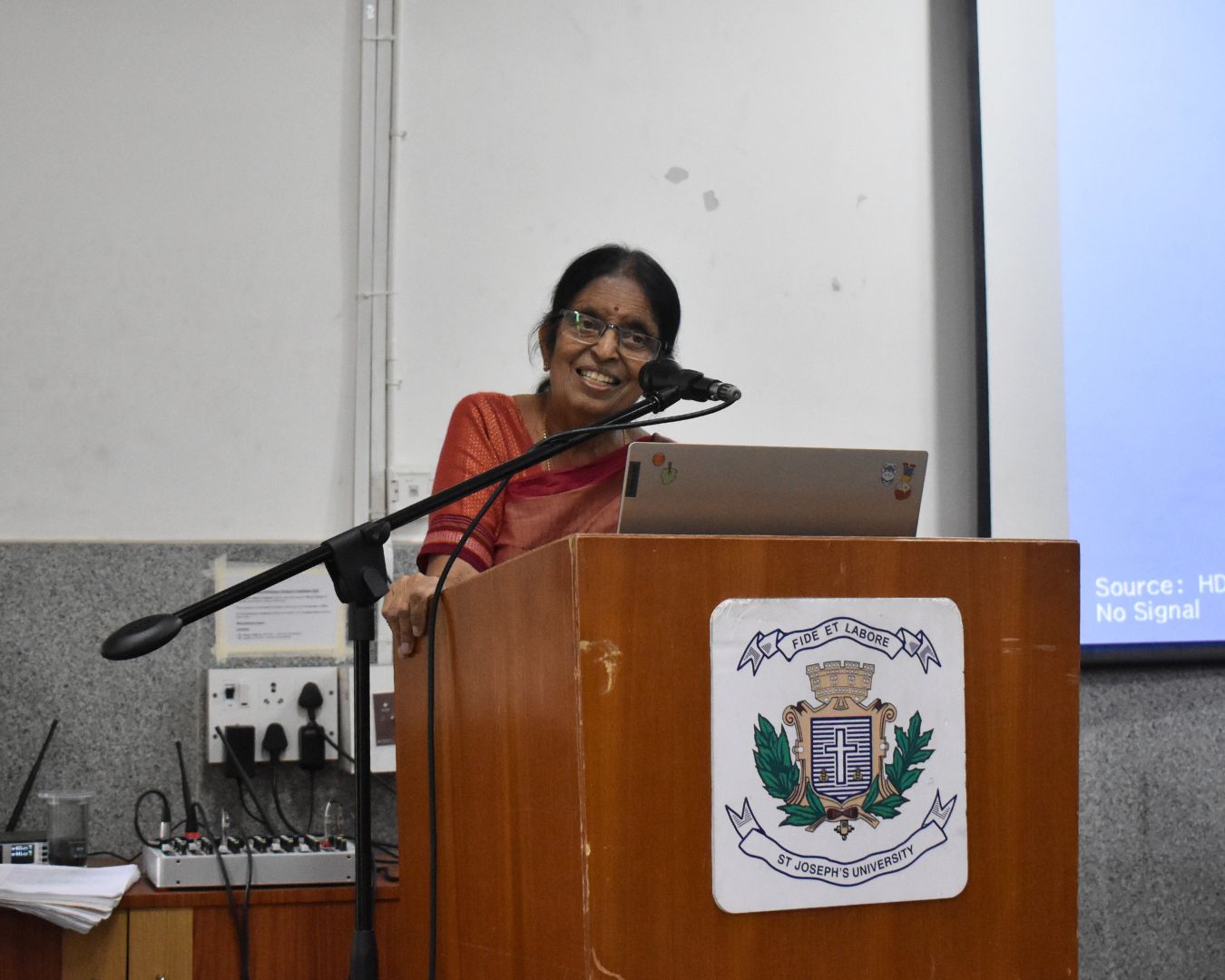The Centre for Law and Policy Research (CLPR), in collaboration with Aweksha- A Women’s Trust and St. Joseph University School of Social Work, organised a workshop on Know Your Rights under the Domestic Violence Act. It was held in St. Joseph University on 25th September, 2025. The event also marked the launch of the Kannada edition of the Domestic Violence Handbook by Aweksha, created to make critical information accessible to women at the grassroots level.
The session opened with a warm welcome and introduction, followed by the formal launch of the Handbook. While the English version has been widely circulated, the Kannada edition was seen as a vital step toward ensuring that women across Karnataka, particularly in rural communities, can access information on their rights and remedies under the DV Act.

Prof. R. Indira, (Professor of Eminence, Head Department of Sociology, School of Social Sciences M.S. Ramaiah University of Applied Sciences, Bengaluru) delivered the keynote address. She highlighted the urgent need for localised resources, noting that many women in Karnataka remain unaware that such a protective law even exists. Drawing from her research on intimate partner violence, she emphasised the importance of outreach in languages that people understand. She condemned the dismissive debates once held in Parliament that suggested “occasional beating” by husbands might not require punishment, calling it a normalisation of violence against women. Prof. Indira urged recognition of the many forms of domestic violence, such as physical, emotional, sexual, and economic, and stressed that this is not merely a women’s issue, but a human rights issue. She concluded by calling on society to break the silence, confront violence wherever it occurs, and create a culture where dignity, equality, and justice prevail.

The event also featured the powerful testimony of a survivor of domestic violence, Farah (name changed). Married for 20 years, she spoke of the culture of forced adjustment, unpaid labour, emotional neglect, and betrayal by her husband. She eventually filed a case with the support of Aweksha and shared how the Handbook became a ray of hope, a guide that restored her dignity, gave her the courage to act, and reminded her of her rights. Her testimony highlighted the importance of awareness, solidarity, and legal literacy in empowering women to seek justice.
Dr. Alan Godfrey, Dean of the School of Social Work at St. Joseph’s University, also addressed the audience, asking them to reflect on their role in perpetuating or challenging systemic biases. He emphasised that domestic violence is a societal problem, not just a personal one and that we form the society. Dr. Godfrey asked participants to recognise that mutual respect, dignity, and care are the foundation of any healthy relationship, and that forcing women to remain in toxic marriages only compounds the injustice. He called for collective responsibility in reporting and protesting violence, stressing the need to “listen to survivors” and “shame the abusers, not the victims.”

Nithya Rajshekhar (Senior Research Associate, CLPR) led the Know Your Rights workshop on the PWDVA. She explained that domestic violence extends beyond physical abuse and includes sexual, emotional, verbal, and economic abuse, as well as dowry-related harassment, and noted the importance of the DV Act recognizing these multiple forms of abuse. She emphasised that the Act protects all women, regardless of age or marital status, including widows, separated and divorced women, and transgender women identifying as women, and clarified the importance of recognising domestic relationships and shared households in order to seek protection. She then outlined the five types of legal orders available under the PWDVA: Protection, Residence, Monetary Relief, Custody, and Compensation, while stressing that violations of protection orders carry real penalties, including imprisonment and fines.
The session also clarified the complaint process, showing how women can approach Protection Officers, Service Providers, Magistrates, or even the Police directly, while also accessing remedies like shelter homes, free legal aid, and medical assistance. Participants discussed Section 498A and the delays caused by the mandatory cooling-off period, highlighting the systemic challenges women face. The session deepened participants’ understanding of the protections available and the hurdles that remain in accessing them.

The closing reflections were delivered by Viola Maria Noronha, HOD of the School of Social Work, St. Joseph’s University. She emphasised the importance of awareness and accessibility of information, collaboration between institutions and communities, survivor-centric approaches, capacity building and accountability of systems and prevention as being equally important as response. She described the Handbook as a living tool that must continue to empower women and ensure their safety, equality, and dignity.
The event concluded with a vote of thanks by Donna Fernandes (President, Aweksha), who expressed gratitude to all participants and speakers. She underlined that knowledge is power and urged everyone to further knowledge of the DV Act to all the women they knew.


